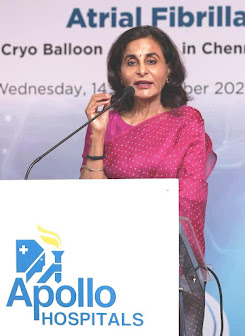Apollo Hospitals has been bringing new life-saving services and procedures to improve health and wellness
Apollo Hospitals Chennai brings "Cryo Balloon Ablation" technology, which offers a solution to a complex and common cardiac rhythm disorder called Atrial Fibrillation performs the first Cryo Balloon Ablation in Chennai of a 64-year-old lady. As a first in India, the hospital also implanted a Left Atrial Appendage Closure (LAAC) Device on a 52year old lady patient following Cryo Balloon Ablation.
Interventional Cardiologist& Electrophysiologist
from Apollo Hospitals have performed minimally invasive procedures on four
patients with atrial fibrillation, using the novel Cryo Balloon Ablation
technology, and in one patient, a Left Artial Appendage Closure device was also
done.
Atrial fibrillation, also known as AF, is an irregular
heart rhythm that affects the upper chambers (atria) of the heart. In AF, the
atrium quivers instead of beating normally. AF can also lead to rapid heart
rhythm, where the heart can beat as much as 300 times a minute or more in the
atria and up to 150 times a minute or more in the lower chambers (ventricles).
Those with AF have a five-time greater risk of stroke and two times greater
risk of heart failure than those with normal heart rhythms.
Atrial Fibrillation (AF) is a common heart rhythm
disorder that affects more than 90 lakh Indians, which increases the risk of
stroke, heart failure and death. In AF, electrical impulses (which dictate the
heart rhythm) are fast and chaotic, leading to irregular heartbeats and making
it less effective in pumping blood.
Explaining the functions of the Cryobaloon Ablation
Technology, Dr AM Karthigesan, a Senior Consultant Cardiologist&
Electrophysiologist at the Apollo Main Hospitals, Chennai said, "Cryoballoon
Ablation” for AF is a new interventional procedure that is employed to control
heart rhythms that are caused by abnormal electrical signals travelling from
the pulmonary veins to the atria. An inflatable balloon uses cold energy to
remove heat from the tissue and disable unwanted electrical signals by creating
a circle of scar tissue (also known as a lesion) around the pulmonary veins. The
balloon is inflated and moved till the opening of the pulmonary vein, plugging
the opening temporarily so the balloon is able to reach a cold enough
temperature. The Cardiac Electrophysiologist then introduces cold energy
(nitrous oxide) into the balloon. The cold energy freezes the tissue where the
balloon touches the opening of the pulmonary vein. This scars the tissue,
stopping the transmission of electrical signals that cause atrial fibrillation.
" Early ablation treatment with Cryo Balloon gives better quality of life
and reduces the risk of heart failure and stroke in AF patients.
He added, "On the other hand, the left atrial appendage closure (LAAC) device closes off an area of the heart called the left atrial appendage (LAA) prevent harmful blood clots that can form in the LAA from entering the bloodstream and potentially causing a stroke in AF. By closing off the LAA, the risk of stroke is reduced and, over time, patients may be able to stop taking blood thinners. Next-generation technology has a new design to help treat more patients safely and effectively to ensure the best long-term outcomes. It's a permanent device that doesn't have to be replaced and can't be seen outside the body. "
These are the new alternatives for patients with AF
who are at risk for a stroke, especially those with a compelling reason not to
be on blood thinners. Patients commonly stay in the hospital overnight and
leave the next day.
Speaking at the conference, Ms. Suneeta Reddy,
Managing Director, Apollo Hospitals Group,
said, "For decades, Apollo Hospitals has been bringing new
life-saving services and procedures to the people to improve their health and
wellness. This new procedure is another reminder of that commitment. ".






Comments
Post a Comment